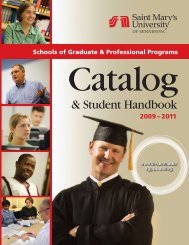PDF version - Saint Mary's University of Minnesota
PDF version - Saint Mary's University of Minnesota
PDF version - Saint Mary's University of Minnesota
You also want an ePaper? Increase the reach of your titles
YUMPU automatically turns print PDFs into web optimized ePapers that Google loves.
Lasallian Core Traditions Program<br />
Lasallian Core Traditions Program<br />
Gregory Sobolewski, Ph. D., Associate Vice-President – Academic Affairs<br />
The Lasallian Core Traditions Program is the required core for the majority <strong>of</strong> the students in the<br />
undergraduate College, and completion <strong>of</strong> the core curriculum partially fulfills the general education<br />
requirements. This core provides a common Lasallian educational experience for students and is<br />
grounded in the university mission and the Lasallian dispositions <strong>of</strong> faith, zeal, service, and community.<br />
These four commitments underscore the ultimate aim <strong>of</strong> the program: to awaken and nurture the<br />
intellectual, spiritual, and personal development <strong>of</strong> learners in preparation for lives <strong>of</strong> service and<br />
commitment to social justice.<br />
The first-year seminar helps new students transition to university life while also beginning to develop<br />
their Lasallian identity as educated, competent, and compassionate members <strong>of</strong> society. In the secondyear<br />
course, students hone their writing skills through the study <strong>of</strong> important texts on the virtuous life<br />
from within the Western tradition, including selections from the life and work <strong>of</strong> <strong>Saint</strong> John Baptist de la<br />
Salle. In the junior year, students explore issues <strong>of</strong> social justice inherent in our emerging global society,<br />
while at the same time refining the knowledge, skills, and Catholic Lasallian values needed to evaluate<br />
and respond appropriately to different perspectives on real world issues, problems, and themes. In<br />
the senior capstone course, students explore the historical and philosophical origins <strong>of</strong> our American<br />
culture and examine how these origins affect our understanding <strong>of</strong> our work, our relationships, our<br />
faith, and our citizenship. The purpose <strong>of</strong> this forward-looking capstone course is to prepare students to<br />
live out the Lasallian charism in contemporary America and the world.<br />
Students must complete the 12 credit-hour Lasallian Core Traditions Program to graduate; first-year<br />
students take LCT140; sophomores take LCT225; juniors take LCT375; and seniors take LCT475. In<br />
addition, all students take ID160, an interdisciplinary and experiential arts course.<br />
Courses<br />
ID160 Artscore 2 credits<br />
The purpose <strong>of</strong> Artscore is to develop in students an appreciation <strong>of</strong> the arts as a vital element<br />
in understanding the human condition and to prepare students for a lifetime <strong>of</strong> arts audience<br />
membership. The course explores the interrelationships among the artist, artwork, and audience using<br />
the concepts <strong>of</strong> freedom and responsibility as integrating themes. Artscore involves preparation for<br />
and evaluation/discussion <strong>of</strong> arts experiences; attendance at arts events is a requirement <strong>of</strong> the course.<br />
Taken before the completion <strong>of</strong> the sophomore year.<br />
LCT140 First-Year Seminar 3 credits<br />
First Year Seminar provides new students at <strong>Saint</strong> Mary’s <strong>University</strong> with an integrated, initial academic<br />
experience that enables them to successfully begin the process <strong>of</strong> developing a Lasallian identity as<br />
educated and compassionate adults committed to ethical participation in our global society. To facilitate<br />
a practical transition from high school to college, emphasis is placed on developing the academic skills<br />
and attitudes necessary for students to think critically about those questions that help shape their<br />
identity as young adults: who am I?, what can I become? and how can I become that person?<br />
LCT225 Perspectives on the Good Human Life 3 credits<br />
Perspectives on the good human life, taken in the sophomore year, moves beyond the first year seminar<br />
focus <strong>of</strong> self-identity to explore various historical and contemporary perspectives on living life well. In the<br />
spirit <strong>of</strong> LaSalle’s commitment to serving others and his recognition <strong>of</strong> the value <strong>of</strong> those less fortunate,<br />
this course challenge students to examine how their own pursuit <strong>of</strong> the good life fits into a larger social<br />
and historical picture. As a writing-intensive course, Perspectives allows students the opportunity to<br />
develop their writing skills from the initial stages <strong>of</strong> critical reading to drafting and revision.<br />
124
















